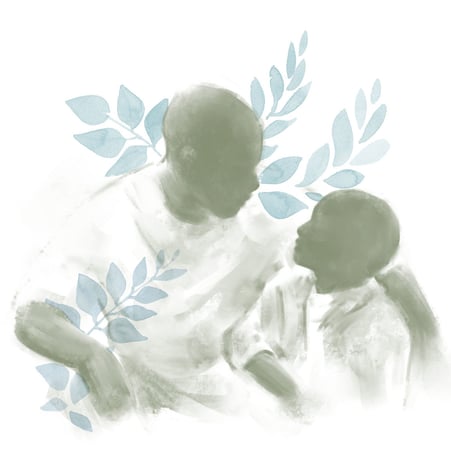Child & Family Therapy.

To better serve the youngest members of our community and their families, WTG is excited to introduce our new Child and Family Therapy Program in NYC.
WTG opened its doors to the vibrant Brooklyn neighborhood of Williamsburg 8 years ago. As our community has grown over the years, we have come to recognize the increased need for progressive mental healthcare dedicated to families and children. While we have been treating children and families all along, we are now proud to offer a comprehensive child-centered program.
This program includes play therapy, individual therapy with young children and adolescents, family therapy, and parent training and support. We also offer a neuropsychological testing program to help parents and teachers understand some of the behavioral and academic challenges children might be facing.
Topics Covered:
-
Why seek therapy for your child or adolescent?
-
Therapy for Adolescents
-
Child Psychiatry
-
Neuropsychological Evaluation and Assessment
-
ADHD
-
Learning Disability
-
Autism Spectrum Disorder
-
Child Therapy
-
Parent Training and Support
Why seek therapy for your child or adolescent?
Parents may seek out treatment for their children for a myriad of reasons. Our psychologists work with children on any issue that may cause social or emotional distress in a child’s life. Life adjustments that often require the support of a therapist include:
- Death or severe illness in the family
- Moving to a new home or school
- Parental separation
- Divorce
Depression, anxiety, and obsessive-compulsive behavior may also manifest in some children. These are common precipitants for parents seeking treatment for their child. Social difficulties, low self-esteem, behavioral problems, or experiencing a traumatic event can also be treated with psychological intervention assistance.
Struggles related to academic and developmental issues may also prompt parents to reach out for help. Learning difficulties and ADHD can significantly impact a child's performance at school. It can take a toll on their social relationships, self-esteem, and emotion regulation abilities.
Parent Training and Support
The psychologists at Williamsburg Therapy Group assist parents in addressing the unique challenges with their family or child. Parent therapy or coaching is helpful for parents who want to enhance their relationships with their children. This service helps provide parents greater insight into their child's functioning and behavior. Such work helps parents gain greater emotional attunement so that the child feels like their needs are being listened to. It is also helpful for parents who are overwhelmed, unable to manage their child, or embroiled in negative interactions or conflicts with their child.
Parent therapy will assist parents on a range of issues, including:
- Bolster healthier family relationships
- Develop appropriate boundaries
- Create effective discipline strategies
- Promote healthy development
- Encourage healthy self-esteem
In addition, a child who is struggling may contribute to stress in the family and or add to a dispute between parents. We can assist you in dealing with parental conflict more effectively to promote greater health within the family system.
Child Therapy
Our team of doctoral-level child psychologists and psychiatrists have training and experience in working with people of all ages. However, our dedicated team at Williamsburg Therapy Group Child and Family has a unique skill-set in working with children, adolescents, and parents. Our psychologists and psychiatrists are experienced in working with children from diverse cultures, families, and backgrounds.
Including children who have faced challenges with:
- Anxiety
- Mood disorders
- Disruptive behavior
- Poor social skills
- Eating disorders
- Impulse control disorders
- Psychosis
- Obsessive-compulsive disorder
- Trauma
- Adoption adjustment
- Gender and sexuality identity formation
- Self-harm
- Comorbid medical conditions
- Suicidality
There are many proven and effective modalities used in modern medicine to treat childhood psychological concerns. Our therapists utilize evidence-based best practices in combination with a genuine, warm, and playful approach. We achieve this by incorporating art, make-believe, or games into sessions.
Therapy for Adolescents
Adolescence is a time of rapid physical change, self-discovery, and social challenge. Teenagers explore new parts of themselves, act in different ways, and experiment with their new independence. It is a time of heightened emotions and insecurity for many teenagers, as their social environments can breed new pressures and confusion. For some, it can even be a time of increased conflict with their parents.
Therapy can offer adolescents a safe space to connect with a trusted adult and process their experience with a trained professional’s guidance. Therapy can also help adolescents navigate the challenges they find themselves facing more effectively.
CBT for Children
Cognitive-behavioral therapy is a type of therapy that focuses on how thoughts and emotions affect behavior. CBT helps children develop new coping mechanisms and change maladaptive thinking patterns that have been contributing to their difficulties. It has also been able to provide them with tangible techniques to enhance coping and reduce distress.
Psychologists at WTG work with children using CBT to address issues including:
- Anxiety and mood disorders
- Obsessive-compulsive disorder
- Impulsivity
- Behavioral problems
- Self-criticism
- Social anxiety
- Emotion regulation difficulties
Play Therapy for Young Children
Play therapy is an approach to psychotherapy designed specifically for young children. Since children often do not have the adequate verbal language to understand or express their emotions, play therapy is a perfect option. Play therapy allows them to process their experience through the language most fluent to them, i.e., play.
Williamsburg Therapy Group uses therapeutic play to communicate with the child and to observe their non-verbal expression. Our psychologists use theoretically-based approaches to play to facilitate healing from stressful experiences and to enhance coping skills and adaptive behavior.
Behavioral Interventions for Children
The psychologists at Williamsburg Therapy Group help clients implement specifically designed behavioral strategies to address a range of emotional and developmental issues.
Some behavioral interventions for children include:
- Learning emotion regulation
- Learning impulse control techniques
- Relaxation and distraction strategies
- Engaging in exposure techniques to manage phobic symptoms
Behavioral interventions promote new skillful behaviors and help improve problematic behaviors by providing parents and children with new skills and techniques. The goal of this approach is to help children gain greater control over their emotions and behavior.
Parents may also take part in the treatment and receive targeted interventions such as:
- Learning how to respond to children in a consistent and predictable manner
- Gaining more effective reinforcement and punishment strategies
- Practicing positive communication skills
- Behavior management techniques for ADHD
Child Psychiatry
Deciding to pursue psychopharmacological intervention for your child can sometimes be a difficult decision. Our psychiatrists are trained to judiciously and thoughtfully assess whether medication could be of benefit. They will work with you to ensure you understand the options and remain closely involved in your child’s treatment course.
Neuropsychological Evaluation and Assessment
Each stage of childhood brings its own challenges and requires developing a unique set of developmental skills. Some children struggle to master age-appropriate tasks, but how and why this happens is not always immediately apparent. Developmental difficulties can present as behavioral problems, academic issues, and or problems in peer or family relationships. When parents, teachers, or therapists notice that a child is struggling with an unclear origin, neuropsychological evaluation and assessment can help.
The neuropsychological evaluations at Williamsburg Therapy Group are individually tailored to each child. The assessment is designed to provide a comprehensive view of a child’s life in both their internal and external worlds. An in-depth array of structured evaluations is used to clarify the child’s brain functioning and its interaction with the child’s environment.
Depending on the reason for the assessment, measures may include:
- Interviews with parents and teachers
- Observations of the child in relevant contexts
- Standardized tests and tasks that assess the child's cognitive skills/functioning
A neuropsychological evaluation aims to provide information on what the child is going through and to implement suggestions on how to treat them. Areas of functioning that are examined by these measures are Intellectual abilities:
- Attention
- Executive functions (e.g., planning, organization, abstraction, and conceptualization)
- Language
- Memory
- Effort and motivation
- Academic skills and achievement
- Problem-solving skills
- Neuropsychological testing can also help identify the presence of underlying disorders
Learning Disabilities:
- ADHD
- Traumatic brain injury
- Emotional functioning
- Behavioral functioning
ADHD
A neuropsychological assessment may be warranted to better understand if your child has symptoms of ADHD. For instance, in children who have displayed a persistent pattern of Learning Disabilities which include:
- Inattention
- Hyperactivity
- Behavioral problems
- Impulsivity
- Problems with executive functioning skills (e.g., memory, problem-solving, planning, organization)
ADHD makes it difficult for children to control their behavior, and it can impact children’s self-regulation, frustration tolerance, and self-esteem. Specific assessment for ADHD helps clarify if an ADHD diagnosis can help make sense of a child’s difficulties.
Using a standardized set of tests and procedures, the neuropsychologist at WTG will determine if the condition is present for your child. From there, they will provide recommendations for how best to move forward.
Learning Disability
A learning disability involves persistent difficulties in comprehending or processing information and often causes impairment in academic achievement or functioning. When a child has significant problems at school, challenges with learning, or struggles to meet educational goals, a neuropsychological assessment can provide information about the nature of these challenges.
A neuropsychological evaluation can establish whether there is a diagnosis such as:
- A specific learning disability
- Math
- Reading
- Writing
- Dyslexia
- Processing disorder
The neuropsychologist at Williamsburg Therapy Group will conduct an individually designed set of standardized tests to define the nature of your child's learning disability. This will also determine whether they meet the criteria for a learning disorder. In addition, a written report of findings, impressions, and recommendations will be provided. If necessary, information and documentation needed to make formal requests for accommodations will also be provided.
Autism Spectrum Disorder
Williamsburg Therapy Group provides assessment of Autism Spectrum Disorders (ASD) and other neurodevelopmental conditions to children as young as two years of age. We focus on a comprehensive understanding of the child’s challenges and strengths while implementing therapeutic strategies that best suit their developmental needs.
What is Autism Spectrum Disorder? The term Autism Spectrum Disorder (ASD) was established in 2013. In the most recent publication of the manual psychologists use to diagnose disorders according to specific criteria. ASD is a neurodevelopmental condition more common in boys than in girls. It exists along a continuum of symptoms and severity that can be identified at an early age. That is why evaluating each child’s development is so important. A child on the autistic spectrum presents difficulties in social interactions and communication and displays restricted and repetitive patterns of behaviors and interests.
Why is an evaluation important? Since ASD is known to affect communication, cognition, and social skills from an early age and at different levels of severity, it is essential to have a comprehensive evaluation with a clinician who understands and recognizes all the nuances of ASD.
An expert evaluation can help clarify the diagnosis and develop a therapeutic plan that best suits the child’s needs and the family culture. An ASD diagnosis can bring many questions to parents and caregivers. The assessment is a first step in helping the family explore solutions to their concerns and functions as a baseline for evaluating future progress.
What are the steps to an ASD evaluation? A comprehensive ASD evaluation usually requires:
- An interview with the caregivers for a detailed history of the child’s early development, strengths, and concerns
- An evaluation of cognitive and socio-emotional skills that considers the child’s chronological age and developmental profile. The assessment can be done in one or more sessions and helps establish strengths and weaknesses in functioning at home, school, and other environments.
- We use the Autism Diagnostic Observation Schedule, Second Edition (ADOS-2), a test to establish the diagnosis of ASD and considered a gold standard component of ASD evaluations.
- To test more broadly for social cognition and adaptive skills, we use other standardized measures and questionnaires, following each child’s needs.
How can therapy help?
Interventions that are tailored to each child can help expand communication, social interaction, and cognitive skills. At Williamsburg Therapy Group, we use empirically-based developmental and naturalistic interventions that are child-centered. Our interventions rely on the brain’s capacity to form new connections, learn and adapt to new experiences, known as neuroplasticity.
Through semi-structured activities and play, the child gradually learns how to communicate and interact with others. We help children direct their interests to develop new cognitive skills. We consider the family to be an integral part of the treatment. Our psychologists assist parents in addressing the daily challenges they might face with their child and improving family interactions.
Child and Family Therapy in NYC
As one of the few mental health collectives in Brooklyn, Williamsburg Therapy Group understands the need for progressive mental health care. With our group of doctoral-level mental health professionals and psychologists, we are prepared to help you face any challenges within your family. To learn more about child and family therapy in NYC, contact us today!
Family Therapy in NYC: Families are an integral part of our lives. Though family can be where our closest relationships started, it can also be difficult and overwhelming to address negative patterns, hurt, and conflict. Family therapy can help develop the ability to communicate effectively, work through conflicts, and strengthen relationships with others.
What is family therapy? Family therapy is when family members attend therapy together to improve their relationships and functioning with a family therapist. The family members who attend are not predetermined, and reasons for seeking family therapy can vary.
Reasons for seeking family therapy can include:
- Parents learning to collaborate and co-parent
- Increasing structure and support for children struggling with emotional and behavioral issues
- Families affected by trauma
- Siblings hoping to address conflict and increase closeness and communication
- Changes in family roles and power dynamics
As fellow New Yorkers with their own families, the Williamsburg Therapy Group providers understand first-hand the need for inclusion. This includes understanding the beauty of diversity, including our concept of who counts as family.
Our providers have experience working with a wide variety of families. This encompasses those with LGBTQIA members, children and adolescents with a range of health issues, and families with diverse cultural and spiritual backgrounds. By providing a safe, structured, and collaborative space, families can learn new ways to address dysfunctional patterns and improve interpersonal relationships.
Feeling better is closer than you think.
We are here to help you no matter where you are at emotionally and want to pair you with a professional that cares and can help.



